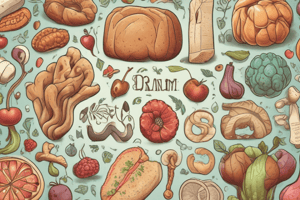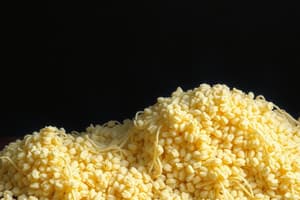Podcast
Questions and Answers
What are the basic building blocks of carbohydrates?
What are the basic building blocks of carbohydrates?
- Amino acids
- Nucleotides
- Fatty acids
- Monosaccharides (correct)
Which of the following is a function of carbohydrates in organisms?
Which of the following is a function of carbohydrates in organisms?
- Structural support in plants (correct)
- Long-term energy storage
- Hormone production
- Transportation of oxygen
How do carbohydrates break down to their monomers?
How do carbohydrates break down to their monomers?
- Through hydrolysis reaction (correct)
- Through condensation synthesis
- By oxidation
- Through fermentation
What is the primary function of lipids in biological systems?
What is the primary function of lipids in biological systems?
Which of the following best describes the structure of lipids?
Which of the following best describes the structure of lipids?
What is one major role of lipids in emulsification?
What is one major role of lipids in emulsification?
Which type of carbohydrate provides sustained energy due to its complex structure?
Which type of carbohydrate provides sustained energy due to its complex structure?
Which statement about carbohydrates is incorrect?
Which statement about carbohydrates is incorrect?
What differentiates saturated fatty acids from unsaturated fatty acids?
What differentiates saturated fatty acids from unsaturated fatty acids?
What is the primary method through which triglycerides are formed?
What is the primary method through which triglycerides are formed?
Which of the following is a primary dietary source of artificial trans-fat?
Which of the following is a primary dietary source of artificial trans-fat?
What health risk is strongly associated with high consumption of trans fats?
What health risk is strongly associated with high consumption of trans fats?
How do unsaturated fatty acids behave at room temperature compared to saturated fatty acids?
How do unsaturated fatty acids behave at room temperature compared to saturated fatty acids?
What is the effect of hydrogenation on unsaturated fats?
What is the effect of hydrogenation on unsaturated fats?
What role do lipids play in the body?
What role do lipids play in the body?
What is the structural component of triglycerides?
What is the structural component of triglycerides?
Which of the following foods are primarily sources of complex carbohydrates?
Which of the following foods are primarily sources of complex carbohydrates?
What is the recommended percentage of total daily calories that carbohydrates should comprise according to dietary guidelines?
What is the recommended percentage of total daily calories that carbohydrates should comprise according to dietary guidelines?
Which function is NOT attributed to lipids in the human body?
Which function is NOT attributed to lipids in the human body?
What role do emulsifiers play in relation to lipids?
What role do emulsifiers play in relation to lipids?
In dietary guidelines, how many grams of carbohydrates should a person consuming 2,000 calories per day aim for?
In dietary guidelines, how many grams of carbohydrates should a person consuming 2,000 calories per day aim for?
What enables lipids to be soluble in water?
What enables lipids to be soluble in water?
Which type of lipid functions primarily as messenger molecules in the body?
Which type of lipid functions primarily as messenger molecules in the body?
Which of the following accurately describes the solubility of lipids?
Which of the following accurately describes the solubility of lipids?
Flashcards are hidden until you start studying
Study Notes
Carbohydrates
- Complex carbohydrates include starches found in pasta, bread, potatoes, legumes, and corn.
- They take longer to digest and provide sustained energy.
- Recommended carbohydrate intake: 45% to 65% of total daily calories; for a 2,000 calorie diet, this is between 900 and 1,300 calories (225 to 325 grams).
- The carbohydrate content of packaged foods can be found on Nutrition Facts labels, which include fiber, total sugars, and added sugars.
Lipids
- Lipids function as energy storage, insulators, and protective cushioning for organs.
- Oils in the diet convert to fats after consumption and serve as nutrients.
- Phospholipids are key membrane components; steroids act as hormones and are found in cell membranes (e.g., cholesterol).
- All lipids are insoluble in water unless emulsifiers are present; emulsifiers have a polar and a nonpolar end that help lipids mix with water.
- Bile contains emulsifiers crucial for lipid digestion.
Types of Fats
- Triglycerides (neutral fats) consist of one glycerol molecule and three fatty acids formed through condensation synthesis.
- Saturated fatty acids have single bonds between carbon atoms and are solid at room temperature; they are fully surrounded by hydrogen.
- Unsaturated fatty acids contain double bonds and are liquid at room temperature; they can be found in hydrogenated forms in foods.
Health Impact of Trans Fats
- The Philippines has initiated a ban on trans fats in prepackaged processed foods to combat high trans fat consumption, reducing risks of coronary heart disease.
- The FDA is taking measures to eliminate trans fats from the American diet.
- Partially hydrogenated oils are the main source of artificial trans fats in processed foods.
Biological Molecules Overview
- Major categories of biological molecules: Carbohydrates, Proteins, Lipids, Nucleic Acids.
- Carbohydrates and lipids are primarily organic polymers made of repeating monomers.
- Common monomers: Carbohydrates (monosaccharides), Proteins (amino acids), Nucleic Acids (nucleotides).
- Polymers are formed through condensation synthesis and can be broken down to monomers via hydrolysis.
Carbohydrate Functions
- Serve quick and short-term energy storage across all organisms.
- Have structural functions in plants, bacteria, and insects, supporting cellular integrity.
Studying That Suits You
Use AI to generate personalized quizzes and flashcards to suit your learning preferences.



